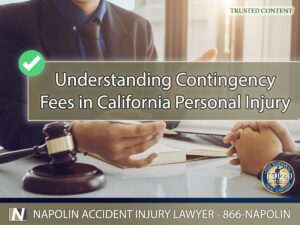Understanding Contingency Fees in California Personal Injury Cases
Napolin Accident Injury Lawyer is dedicated to assisting injury victims in Southern California with navigating the complexities of personal injury cases. An essential aspect of this process is understanding contingency fees, which are a common payment structure in personal injury law. Grasping how contingency fees operate allows injured citizens to make informed decisions when selecting legal representation. This article provides a comprehensive look at contingency fees, their benefits, potential drawbacks, and how they are regulated in California.
What Are Contingency Fees?
Contingency fees are a type of payment arrangement where the lawyer's fee is contingent upon winning the case. This means that the attorney only gets paid if the client receives a settlement or court award. This fee structure is particularly beneficial for clients who may not have the financial resources to pay for legal services upfront. The contingency fee model aligns the interests of both the client and the attorney, as both parties have a vested interest in the successful outcome of the case. It also provides access to legal representation for individuals who might otherwise be unable to afford it.
How Contingency Fees Work
In a contingency fee arrangement, the lawyer and client agree on a percentage of the recovery that will be paid to the lawyer if the case is successful. This percentage is typically discussed and agreed upon before the lawyer takes on the case. It is essential for clients to read and understand the fee agreement thoroughly to avoid any surprises later. The agreed percentage can vary but generally ranges from 25% to 40% of the total recovery amount. This percentage might be influenced by factors such as the complexity of the case, the likelihood of success, and the anticipated length of the legal process.
Payment Upon Case Resolution
The lawyer's payment is derived from the settlement or award received at the end of the case. If the client does not win, the lawyer does not receive a fee for their services. This system motivates attorneys to work diligently on behalf of their clients to secure a favorable outcome. Additionally, the payment upon case resolution means that clients do not need to worry about legal fees during the litigation process, allowing them to focus on recovery and rehabilitation. It is crucial, however, for clients to be aware of other potential costs that might not be covered by the contingency fee, such as court costs and expert witness fees.
Benefits of Contingency Fees
Contingency fees offer multiple advantages that make legal representation accessible and affordable for injury victims. The following benefits highlight why this fee structure is often preferred:
- Financial Accessibility: Contingency fees eliminate the need for upfront payment, making it possible for clients to pursue justice without financial constraints.
- Motivated Representation: Lawyers are incentivized to achieve the best possible outcome for their clients, as their payment is tied to the success of the case.
- Reduced Financial Risk: Clients do not have to worry about incurring legal fees if their case is unsuccessful, as the lawyer's payment depends on winning the case.

Considerations and Potential Drawbacks of Contingency Fees
Considerations and Potential Drawbacks of Contingency Fees
While contingency fees provide many benefits, it is important for clients to be aware of potential drawbacks and considerations.
Additional Costs
Clients should be mindful that, although contingency fees cover the lawyer's payment, there may be additional costs such as court fees, expert witness fees, and document charges. Discussing these potential expenses with the lawyer upfront is crucial to avoid unexpected financial burdens. Knowing the full scope of potential costs helps clients make informed decisions about proceeding with their case.
Transparency and Understanding
Ensuring full understanding of the contingency fee agreement is vital. Transparency from the lawyer is crucial, and clients should feel comfortable asking questions about any part of the agreement they do not understand. A clear and detailed fee agreement helps prevent misunderstandings and disputes later on. It should outline all potential costs, the percentage the lawyer will take from the recovery, and any other relevant terms.
Addressing Concerns
There can be misconceptions about contingency fees, such as hidden costs or unfair percentages. Clients should address any concerns with their lawyer and seek clarity on all aspects of the agreement. Open communication is essential to ensure that clients feel confident and informed about their legal representation. Lawyers should provide thorough explanations and be willing to discuss any adjustments to the fee structure that might be necessary.
Contingency Fees in California
California has specific regulations and ethical guidelines governing contingency fees. These rules are designed to protect clients and ensure fair practices. Lawyers must provide clients with a written agreement outlining the terms of the contingency fee.
Fee Variations
The percentage charged by lawyers can vary based on the complexity of the case and the stage at which the case is resolved. More complex cases or those that go to trial may involve higher contingency fees. In California, it is common for contingency fees to range between 33% and 40%, but this can vary. Clients should discuss these variations with their lawyer to understand how the specifics of their case might affect the fee structure.
Informed Consent
Informed consent is a critical aspect of contingency fee agreements. Clients must be fully aware of and agree to the fee structure before proceeding with legal representation. This ensures that clients make informed decisions about their legal matters. Lawyers are required to explain the fee agreement in detail, answering any questions the client may have. This process helps build trust and ensures that clients are comfortable with the terms of their agreement.

Choosing the Right California Personal Injury Lawyer For You
Choosing the Right California Personal Injury Lawyer For You
When selecting a personal injury lawyer, it is important to consider various factors to ensure the best legal representation.
Experience and Success Rates
Evaluating a lawyer's experience and success rates is crucial. Lawyers with a proven track record in personal injury cases are more likely to secure favorable outcomes for their clients. Experienced lawyers bring valuable insights and expertise to the table, which can significantly impact the success of a case. Clients should research potential lawyers' backgrounds, looking for those with extensive experience in personal injury law.
Transparent Communication
Effective and transparent communication is key to a successful lawyer-client relationship. Clients should choose a lawyer who communicates clearly and keeps them informed throughout the case. Regular updates and honest discussions about the progress of the case help ensure that clients are always in the loop. This transparency builds trust and allows clients to feel confident in their legal representation.
Trust and Confidence
Trust is fundamental when working with a personal injury lawyer. Clients should feel confident in their lawyer's ability to represent their best interests and achieve a positive outcome. Building a trusting relationship begins with open communication and mutual respect. Clients should feel comfortable discussing their concerns and confident that their lawyer is dedicated to achieving the best possible result for their case.
Key Questions to Ask When Choosing a Lawyer
To ensure you select the right personal injury lawyer, consider asking the following questions:
-
- What is your experience with personal injury cases similar to mine?
- What is your success rate in personal injury cases?
- How do you communicate with your clients throughout the case?
- What is your approach to contingency fees and additional costs?
- Can you provide references from past clients?
These questions can help you gauge the lawyer's expertise, communication style, and overall fit for your needs.

Understanding Contingency Fees in California Personal Injury Cases
Understanding Contingency Fees in California Personal Injury Cases
Understanding contingency fees is essential for injury victims seeking legal representation. This fee structure offers numerous benefits, including financial accessibility and motivated representation, while reducing financial risk for clients. At Napolin Accident Injury Lawyer, we have extensive litigation experience and are dedicated to providing skilled and compassionate legal representation. If you or a loved one has been injured and needs legal help, contact us at (866)-NAPOLIN for a free consultation. We are committed to helping you navigate your personal injury case and secure the justice you deserve.
- A Guide on Red Light Auto Accidents in California - August 14, 2024
- Self-Representing in a California Personal Injury Claim - August 13, 2024
- Common Sources of Distraction for Drivers in California - August 13, 2024
